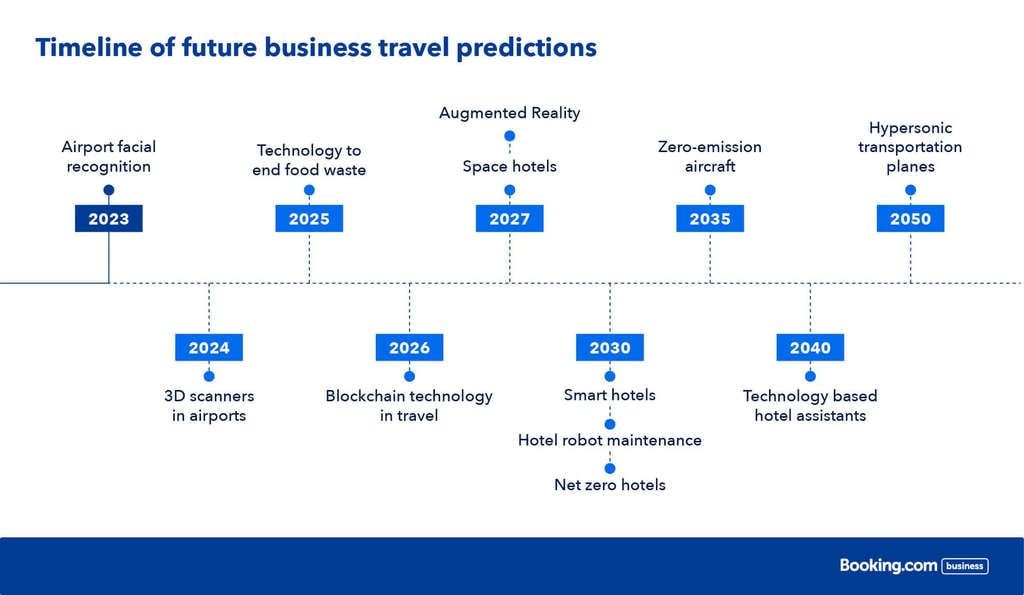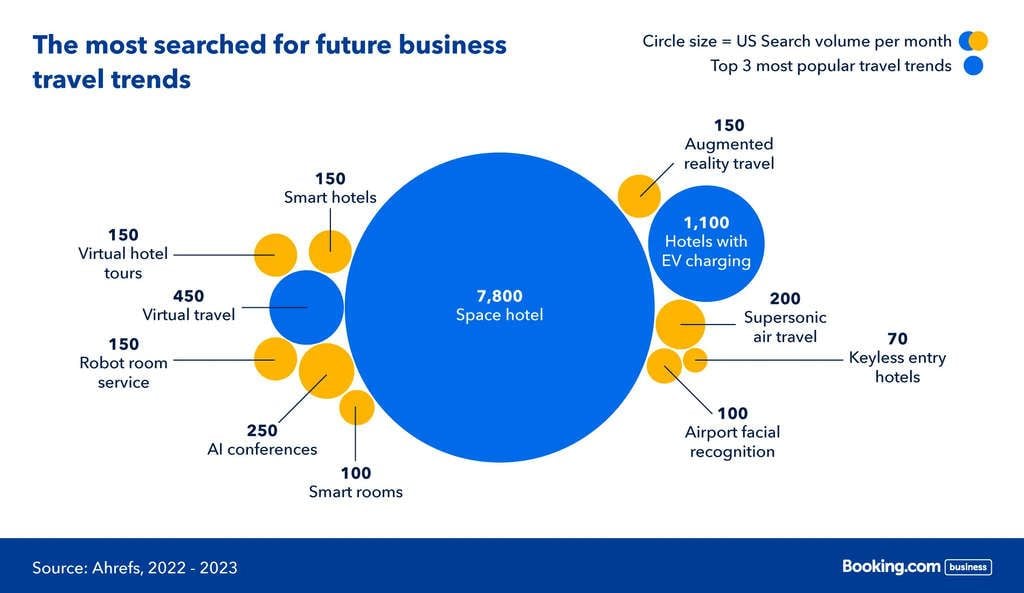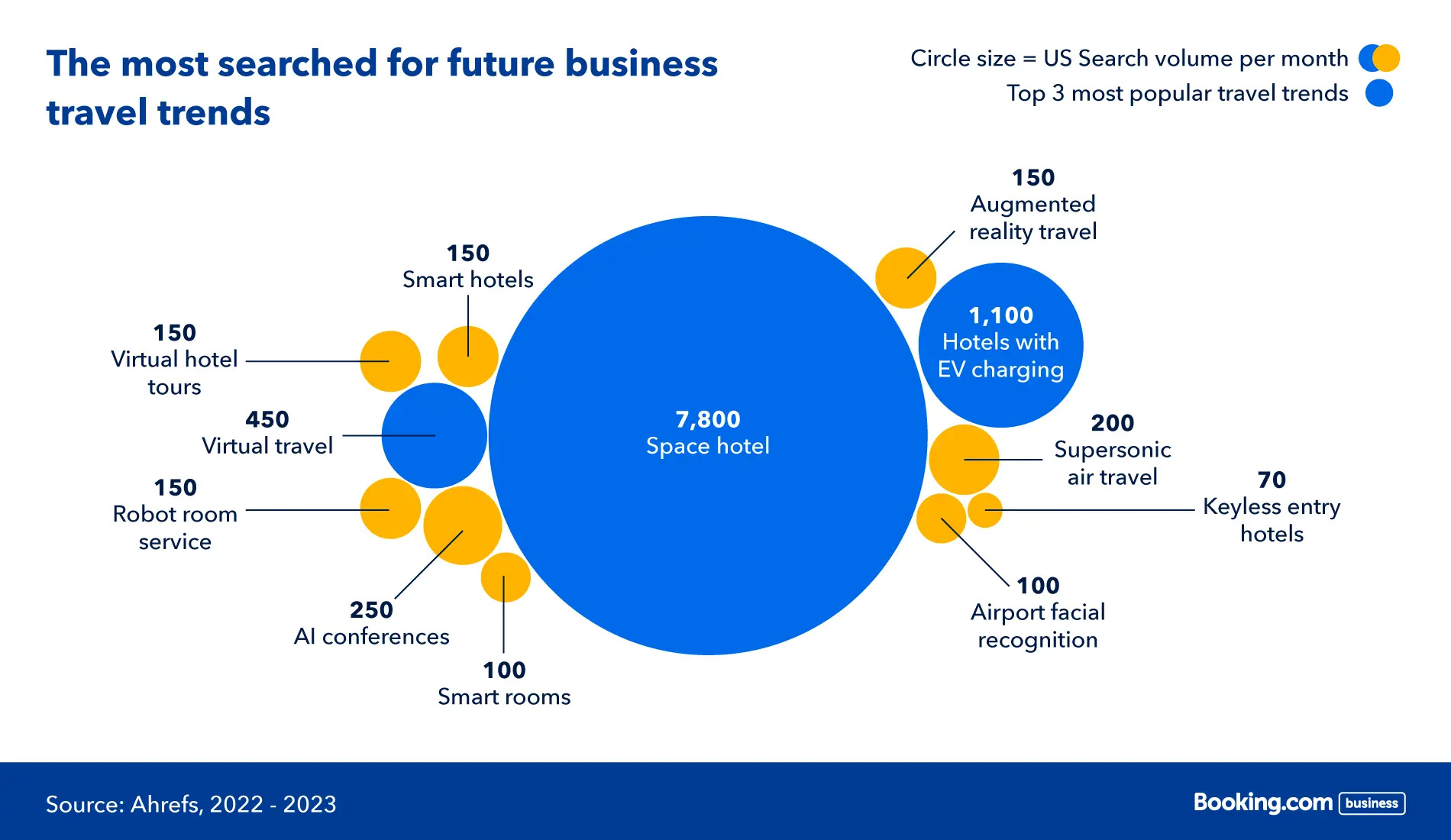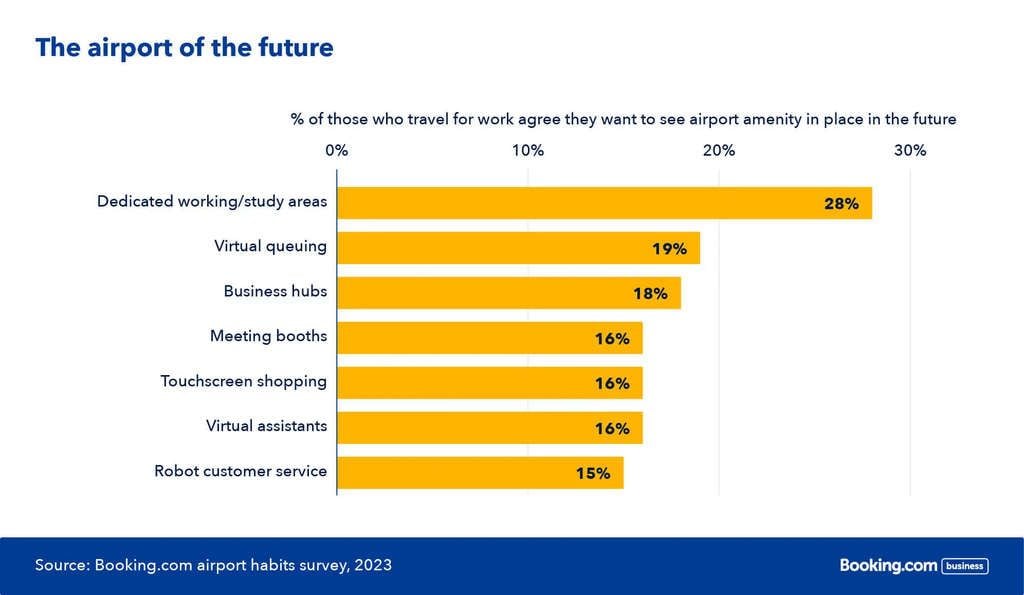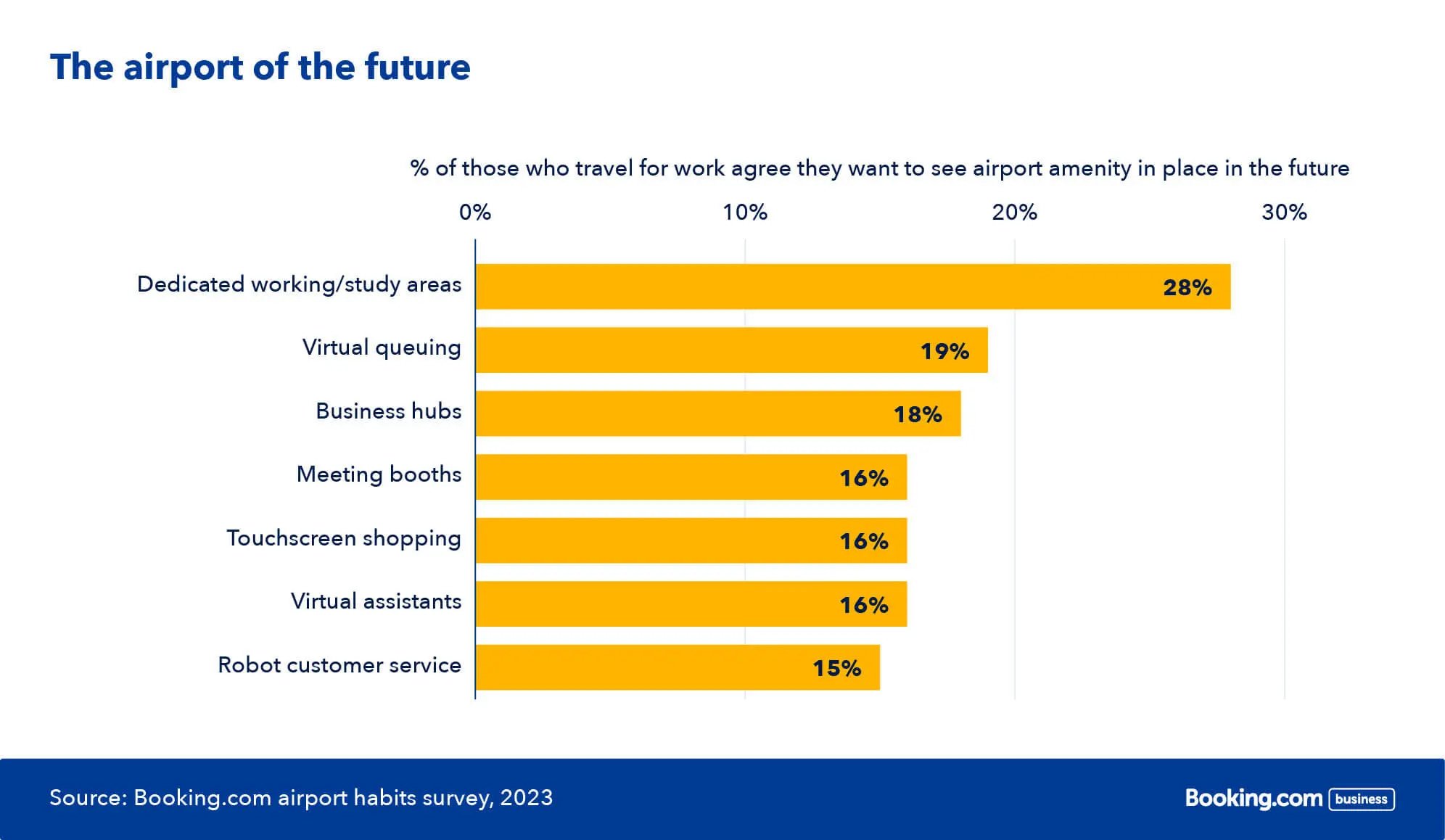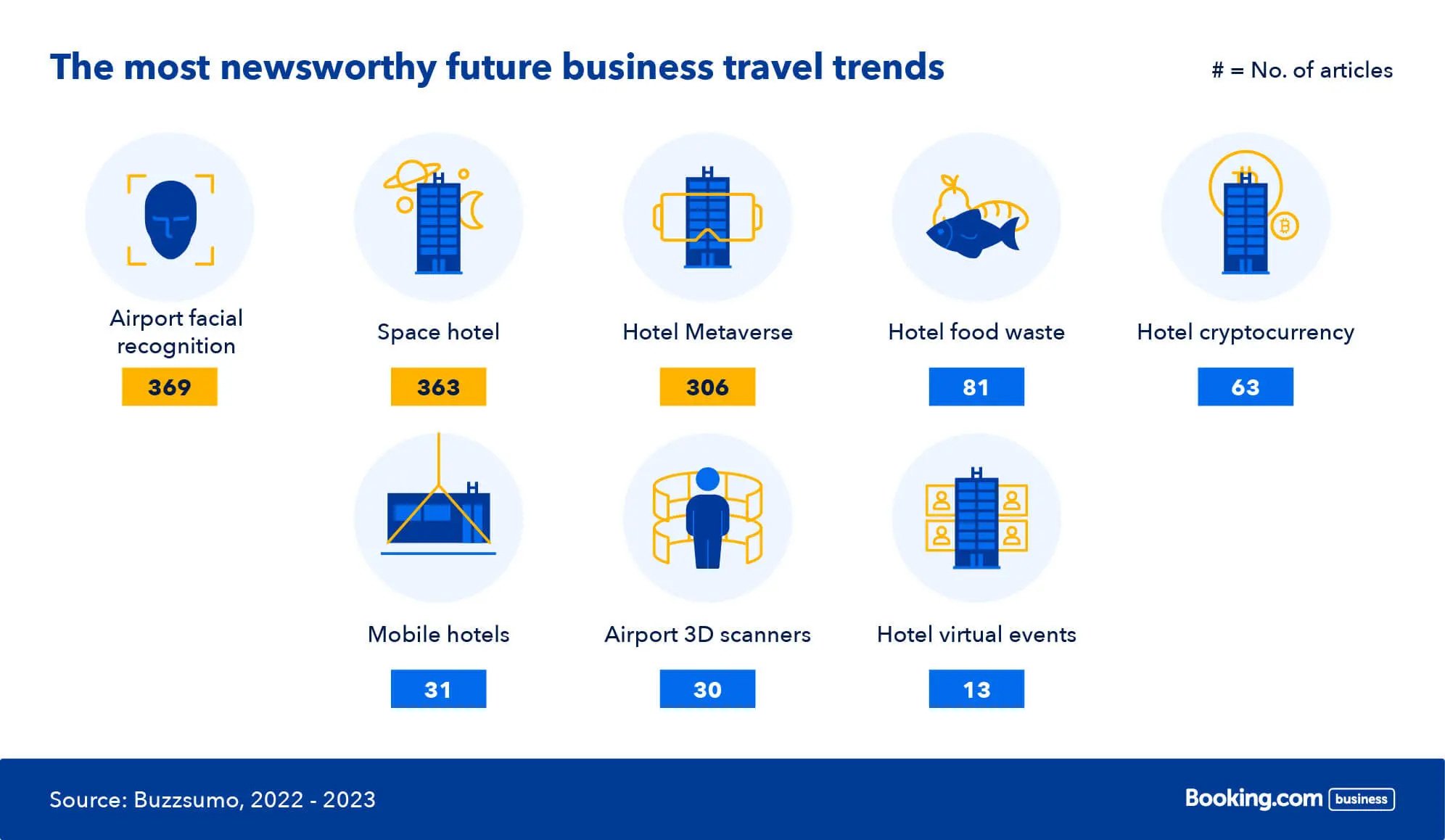The Future of Business Travel

When can we expect to see space business parks, robot room service and zero-emission aircraft? Will we meet with clients in the metaverse, teleport to conventions or even host corporate events in outer space? What exactly is the future of business travel?
No one can know for sure. However, at Booking.com for Business, we have been analyzing data to reveal the most discussed future business travel trends and topics, and what business travelers can expect to see on work trips in the coming years and decades.
- Timeline of future business travel predictions
- The most searched for future business travel trends
- The airport of the future
- The most newsworthy future business travel trends
- Conclusion
- Methodology
- Sources
Timeline of future business travel predictions
After researching articles and reports that reference future travel trends alongside specific years, we’ve created a timeline of predicted developments in business travel too, running from now right up to 2050.
2023

Facial recognition technology is already being tested in major airports in order to verify people’s ID. It’s reported to improve travel security and efficiency, speeding up the boarding process. If trials continue to prove successful, facial recognition tech could be rolled out nationwide in the US by the end of 2023, saving regular business travelers time that could be spent more productively.
2024

By 2024, 3D CT scanners could eliminate the inconvenience of having to take out laptops and electronics when going through security - it’s already being trialed in some airports. It’s thought that this imaging technology will also allow the restriction on liquids to be lifted in the UK by 2024, with other countries expected to follow suit. 3D scanners will inevitably save business travelers valuable time and make taking a flight a little more hassle-free.
2025

After successful pilot programs some hotels are already using AI technology to reduce food waste. The Iberostar Group, in particular, is using tech to support its goal of being landfill waste-free by 2025, by tracking exactly how much food is stored and thrown away, and using this data to suggest ways in which waste could be reduced. Pioneering accommodation like this gives business travelers an opportunity to choose an environmentally-friendly stay, benefiting the planet, as well as organizations with carbon-impact initiatives and sustainable targets.
2026

It’s predicted that blockchain technology such as NFTs (non-fungible tokens; digital files secured by a blockchain for secure trading) will continue to grow and find more and more use in business travel. Uses so far include digital art that allows users to explore pathways to accommodation properties, and exclusive digital passes giving recipients rewards and discounts. They’re also being used for airline tickets and business travelers could soon find themselves needing NFTs to access special hotel room packages or co-working spaces.
2027

Plans are already underway to open the first-ever space hotel/business park by 2027. This luxury space station will include a rotating structure in order to simulate gravity at its edges, but will also offer unique activities such as low-gravity basketball, rock climbing and trampolining.
While some businesses will be keen to book extraplanetary meetings and events as soon as possible, the cost will be prohibitive for others. Reservations are currently priced at $5 million, and that’s for a stay of just 3.5 hours!

Another futuristic trend that may come into play in 2027 is augmented reality (AR). AR-enabled apps benefit business travelers in a number of ways - from navigating unfamiliar places to translation in foreign countries. It also allows people to take virtual tours remotely, or visit a site and see it enhanced with additional layers of information. Similarly, product demonstrations can be brought to life with AR, allowing clients and customers to visualize and interact with products in new ways.
However, right now AR is limited, lacking a wide field of view and having resolution, battery and 3D-sensing issues. Its appeal and uptake is therefore limited, but it’s thought that by 2027 people will have access to unconstrained, immersive AR experiences, and the associated advantages for traveling professionals.
2030

Guest comfort and energy efficiency will be managed and optimized by AI in smart hotels, according to the predictions. This will include managing heating and cooling systems, for instance, to reduce energy consumption and costs - again, great news for companies with green aspirations.

While this concept is already in action in certain restaurants, in the near future business travelers could see robots replacing some staff on a larger scale, providing services such as cleaning and room service in hotels and helping visitors navigate their accommodation. Robotic staff will also be able to act as translators and perform customer service roles to ensure work trips go smoothly and business guests enjoy a comfortable stay.

Also by 2030, businesses will be able to cut their carbon footprint by booking net-zero accommodation. Hilton opened the US’s first net-zero hotel in 2022, which is powered entirely by solar energy. Such sustainable hotels are expected to be widespread by the end of the decade.
2035

Business travelers might be able to reduce their environmental impact even further by taking to the skies on zero-emission commercial aircraft. Airbus has revealed three concept aircraft already and could have such a plane in service by 2035. This would be a huge win for organizations wanting to reduce their carbon emissions as part of sustainability programs.
2040

As well as robotic staff, automated systems will likely make checking in and out completely seamless and hassle-free, whether during the day or outside of regular operating hours. Luggage could also be stored and shipped to another destination for business guests, saving them time and allowing them to attend meetings without having to lug around heavy cases. By 2040 this sort of seamless travel should be ubiquitous, and hopefully, the travel industry will be achieving net-zero targets.
2050

Corporate travel could take place on hypersonic rocket planes by 2050, which are expected to travel at speeds over 15,000 mph. This could open up new business markets and opportunities in distant countries and regions, thanks to drastically reduced travel times (Europe to Australia in 90 minutes!). Travel will become less time-consuming, and therefore allow more time for either business or leisure at the other end.
Looking forward
The above may only be predictions, but in-depth research suggests that this timeline is likely. Of course, there’s still much debate about future business travel trends. Another way to explore the future of business travel is to look at which topics are the most searched for online.
The most searched for future business travel trends
Which are business travelers fascinated by and most looking forward to seeing in reality? Supersonic aircraft? Augmented reality travel? To answer this question, we explored the trends with the most internet searches, revealing the hottest topics right now.
The most popular topic by far is space hotels, showing that people are really intrigued by the idea of truly cosmic business, leisure and even bleisure trips.
Mobile hotels, or “Autonomous Travel Suites”, are driving a lot of searches too. What is a mobile hotel? The idea is fully-functional, battery-powered accommodation on wheels, which can pick guests up and take them to their destination while they rest. Ideal for stress-free, efficient business travel!
Other popular topics include virtual travel, reducing the necessary number of business trips and giving corporate travelers the chance to explore the world with VR and metaverse experiences. VR could really come into its own here and have a big impact on the travel industry, with benefits such as:
- Immersive tours of accommodation, events venues and more prior to booking, to ensure they suit a business’ needs
- Virtual instead of in-person conferences and industry events
- Virtual visits to offices, factories and other professional settings
- 360-degree in-flight entertainment when people do fly for work
While topics like virtual travel are clearly intriguing business travelers, trends such as facial recognition and supersonic aircraft show that people will still need airports (or even space ports!). But what will the airport of the future look like, and how will it deal with the changes we’re predicting?
The airport of the future
Regular business travelers spend a lot of time queuing and waiting around in terminals, so who better to ask what the airport of the future should look like? Booking.com’s 2023 airport travel habits survey reveals what business travelers want to see in the terminal when they’re preparing to jet off.

Our survey results show that 28% of business travelers think the airport of the future must have dedicated spaces in which they can focus. This would be a fantastic benefit for business travelers, who often have to try and work in crowded and noisy waiting areas.

Nearly 1 in 5 travelers rate virtual queuing as a technological advancement that could improve their airport experience - ranking it 2nd of those specific to business traveler's needs and 4th out of the 20 future amenities that all travelers would most like to see in future airports. This would make the transition from check-in to plane more efficient, giving business travelers extra time to work or relax before boarding, as well as shortening the time spent on travel overall.

18% of travelers want to see business hubs in airports. These hubs would go beyond work/study spaces to provide an office-type environment, in which professionals and colleagues can hold meetings, make calls and focus on work away from the terminal. Travelers on work trips clearly want to be able to carry on with business as usual, wherever they are.

Our survey reveals that 16% think individual meeting booths or pods would be a great addition. This way, professionals will be able to virtually check in with colleagues and clients, even when waiting for business travel flights. This shows once again that business travelers still want to be able to focus when on the move.

16% would like to see touchscreen shopping in the airport of the future. Anything that can save time is a win for business travelers, and if they can get what they need without having to walk the length of the terminal, they will not only shorten their overall travel time, but also win back time that could be used answering emails or preparing for a meeting.

The same portion of respondents (16%) want to see virtual assistants in terminals. In fact, some airports are already using them to help passengers navigate and get through checkpoints. Business travelers could certainly benefit from virtual assistants, which should speed up check-in, security and boarding processes, and be available to share information quicker than most human staff could.

And finally, 15% think robot customer service would be a great way to handle any travel hurdles - for example, providing travelers with options and alternatives in the event of missed or canceled flights. As well as improving efficiency, this could help reduce overall travel costs by removing the need for as many human airport/airline staff.
So, what do business travelers want from the airport of the future, and what do airports need to do to stay on top of the business travel game? In short, somewhere to work, and a fast and efficient process from check-in to boarding, expedited by virtual and robotic assistants.
The most newsworthy future business travel trends
So we know what business travelers want from the airport of the future, and we’ve already explored the most searched-for future travel trends, but which are the most talked about in the news? Facial recognition wins out here, but there are some other intriguing topics getting press coverage at the moment.
We did some digging and examined the trends with the greatest number of articles written about them.
Airport facial recognition - which should speed up and de-stress business trips significantly - is the most talked about future travel topic right now, featuring in 369 articles in the past year.
The topic most discussed after facial recognition is space hotels. As mentioned, there are plans for the first cruise ship-style cosmic accommodation/business park to open within just a few years, and this is clearly big news.
Next comes hotels and the Metaverse - in other words virtual travel, allowing businesses and clients to come together remotely, or view business hotel rooms and meeting spaces prior to booking.
Other hot topics include hotels where cryptocurrency is accepted and mobile hotels.
Technology, space hotels and the metaverse are claiming the most column inches currently, clearly indicating the topics the media thinks will engage readers best. Perhaps because, according to our predictions, business travelers can look forward to seeing these innovations in the near future.
Conclusion
So, what does the future of business travel look like? Well, data helps us create a picture of what we’re likely to see in the coming years.
One thing is certain - technology will be at the heart of how business travel evolves. Prior to booking, virtual travel will allow tours of accommodation and events spaces. At the airport, 3D scanners, virtual queuing and robotic assistants will make the experience more efficient. And travel will be more enjoyable and much faster too, with enhanced in-flight entertainment and hypersonic rocket planes on the horizon.
Future hotels will rely on technology too, from robotic staff and AI to mobile hotels. And then there’s the promise of space hotels, making out-of-this-world business travel an imminent reality!
Technology will also help business travel become more sustainable. Zero-emission aircraft and net-zero hotels will hugely benefit businesses with carbon-reduction targets, thereby benefiting the planet.
Which of these future changes do you think would benefit you the most?
Methodology
- Future travel trend predictions Methodology: We examined 11 articles that reference future travel and future business travel trends alongside a year in the future.
- Most popular future travel trends Methodology: Using Ahrefs we took themes and topics from future travel trends and looked at US search volumes to establish popularity.
- Most talked about future travel trends Methodology: We searched Buzzsumo over the last 12 months for articles covering our discovered future travel topics. The total number of articles containing these keywords was then totalled.
- Airport of the future Methodology: We used Booking.com’s own primary survey data commissioned by CensusWide, December 2022, polling travelers from the US, UK, Spain, Germany, Australia, Canada, Italy and France, to see what amenities they would love to see in airports of the future.
Data correct as of February 2023.
Sources
- Washington Post: TSA testing facial recognition technology in airports
- The Times: New 3D scanner technology changes requirements on electronics and liquids through airport security
- Hotel Technology News - Iberostar is the latest hotel group to use technology to reduce food waste in its hotels
- Hotel Technology News - NFT hotel packages could be the future
- Hotelmize - Examples of NFT use in travel
- Outlook India - NFTs used for flight tickets
- Syfy - Space hotels predicted in the next decade
- Jabil - The future of VR and AR in travel
- Hotel Online What smart hotels will mean for travelers
- Globetrender - How robots will play a role in travel and hospitality
- Business Traveller - Hilton to open first net-zero hotel
- Airbus - Airbus reveals new zero-emission concept aircraft
- Travel Market Report - 2040 travel predictions
- Scientific American - Hypersonic rocket planes are in development
- Forbes - How VR and AR are transforming the travel industry
- Booking.com for Business: The Future of Business Travel
About Booking.com
Part of Booking Holdings Inc. (NASDAQ: BKNG), Booking.com's mission is to make it easier for everyone to experience the world. By investing in the technology that helps take the friction out of travel, Booking.com's marketplace seamlessly connects millions of travelers with memorable experiences every day. For more information, follow @bookingcom on social media or visit globalnews.booking.com. For more information, follow @bookingcom on social media or visit globalnews.booking.com.

